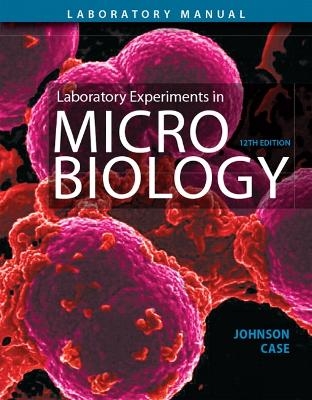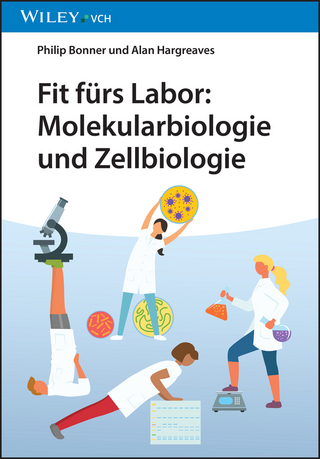
Laboratory Experiments in Microbiology
Pearson (Verlag)
978-0-13-460520-3 (ISBN)
- Titel z.Zt. nicht lieferbar
- Versandkostenfrei
- Auch auf Rechnung
- Artikel merken
Laboratory Experiments in Microbiology features 57 thoroughly class-tested and easily customizable exercises that teach basic microbiology techniques and applications. The manual provides comprehensive coverage of every area of microbiology across diverse disciplines, including the biological sciences, allied health sciences, agriculture, environmental science, nutrition, pharmacy, and various pre-professional programs. The lab manual is the perfect companion to Tortora/Funke/Case’s Microbiology: An Introduction, 13th Edition or any introductory microbiology text.
The 12th Edition of Laboratory Experiments in Microbiology is easier than ever to navigate and more visually effective with new icons indicating when an exercise addresses the human or environmental microbiome, is investigative, or addresses an ASM guideline. New ASM Thinking Skills outline the steps that help develop laboratory thinking skills. Pre-lab quizzes in MasteringTM Microbiology ensure students arrive prepared for each lab, and activities such as Lab and Lecture: Putting It All Together help students see how lab and lecture are integrated.
About our authors Ted R. Johnson is a professor emeritus of biology at St. Olaf College, a liberal arts college in Northfield, Minnesota, where he has taught courses in microbiology and immunology. He has taught at St. Olaf for 39 years and previously taught at Mankato State University for five years. He received his master’s degree and his Ph.D in microbiology from the University of Illinois in Chicago, Illinois. While at St. Olaf College, he has developed and directed several semester abroad and interim programs. He has been involved in advising health professions students and received the Fr.Joseph Walter Award for Health Profession advising. His research focuses on the immune response to virally induced cancer in various animal models. Christine L. Case is a professor of microbiology at Skyline College in San Bruno, California, where she has taught for the past 47 years. She received her Ed. D. in curriculum and instruction from Nova Southeastern University and her M.A. in microbiology from San Francisco State University. She was Director for the Society for Industrial Microbiology (SIM). She received the ASM and California Hayward outstanding educator awards and SACNAS Mentor award. In addition to teaching, Chris contributes regularly to professional literature, develops innovative educational methodologies, and maintains a personal and professional commitment to conservation and the importance of science in society. Chris is also an avid photographer, and many of her photographs appear in this lab manual.
PART ONE MICROSCOPY
Use and Care of the Microscope
Examination of Living Microorganisms
PART TWO HANDLING BACTERIA
Microbes in the Environment
Transfer of Bacteria: Aseptic Technique
PART THREE STAINING METHODS
Preparation of Smears and Simple Staining
Negative Staining
Gram Staining
Acid-Fast Staining
Structural Stains (Endospore, Capsule, and Flagella)
Morphological Unknown
PART FOUR CULTIVATION OF BACTERIA
Isolation of Bacteria by Dilution Techniques
Special Media for Isolating Bacteria
PART FIVE MICROBIAL METABOLISM
Carbohydrate Catabolism
Fermentation
Protein Catabolism, Part 1
Protein Catabolism, Part 2
Respiration
Unknown Identification and Bergey’s Manual
PART SIX MICROBIAL GROWTH
Oxygen and the Growth of Bacteria
Determination of a Bacterial Growth Curve: The Role of Temperature
Biofilms
PART SEVEN CONTROL OF MICROBIAL GROWTH
Physical Methods of Control: Heat
Physical Methods of Control: Ultraviolet Radiation
Chemical Methods of Control: Disinfectants and Antiseptics
Chemical Methods of Control: Antimicrobial Drugs
Effectiveness of Hand Scrubbing
PART EIGHT MICROBIAL GENETICS
Regulation of Gene Expression
Isolation of Bacterial Mutants
Transformation of Bacteria
DNA Fingerprinting
Genetic Engineering
Ames Test for Detecting Possible Chemical Carcinogens
PART NINE THE MICROBIAL WORLD
Fungi: Yeasts and Molds
Phototrophs: Algae and Cyanobacteria
Protozoa
Parasitic Helminths
PART TEN VIRUSES
Isolation and Titration of Bacteriophages
Plant Viruses
PART ELEVEN INTERACTION OF MICROBE AND HOST
Epidemiology
Koch's Postulate
PART TWELVE IMMUNOLOGY
Innate Immunity
Agglutination Reactions: Slide Agglutination
Agglutination Reactions: Microtiter Agglutination
ELISA Technique
PART THIRTEEN MICRORGANISMS AND DISEASE
Bacteria of the Skin
Bacteria of the Respiratory Tract
Bacteria of the Mouth
Bacteria of the Gastrointestinal Tract
Bacteria of the Urogenital Trac
Identification of an Unknown from a Clinical Sample
Rapid Identification Methods
PART FOURTEEN MICROBIOLOGY AND THE ENVIRONMENT
Microbes in Water: Multiple-Tube Technique
Microbes in Water: Membrane Filter Technique
Microbes in Food: Contamination
Microbes Used in the Production of Foods
Microbes in Soil: The Nitrogen and Sulfur Cycles
Microbes in Soil: Bioremediation
APPENDICES
A. Pipetting
B. Dilution Techniques and Calculations
C. Use of the Spectrophotometer
D. Graphing
E. Use of the Dissecting Microscope
F. Use of the Membrane Filter
G. Electrophoresis
H. Keys to Bacteria
| Erscheinungsdatum | 29.01.2018 |
|---|---|
| Sprache | englisch |
| Maße | 229 x 269 mm |
| Gewicht | 916 g |
| Themenwelt | Naturwissenschaften ► Biologie ► Allgemeines / Lexika |
| ISBN-10 | 0-13-460520-9 / 0134605209 |
| ISBN-13 | 978-0-13-460520-3 / 9780134605203 |
| Zustand | Neuware |
| Informationen gemäß Produktsicherheitsverordnung (GPSR) | |
| Haben Sie eine Frage zum Produkt? |
aus dem Bereich


